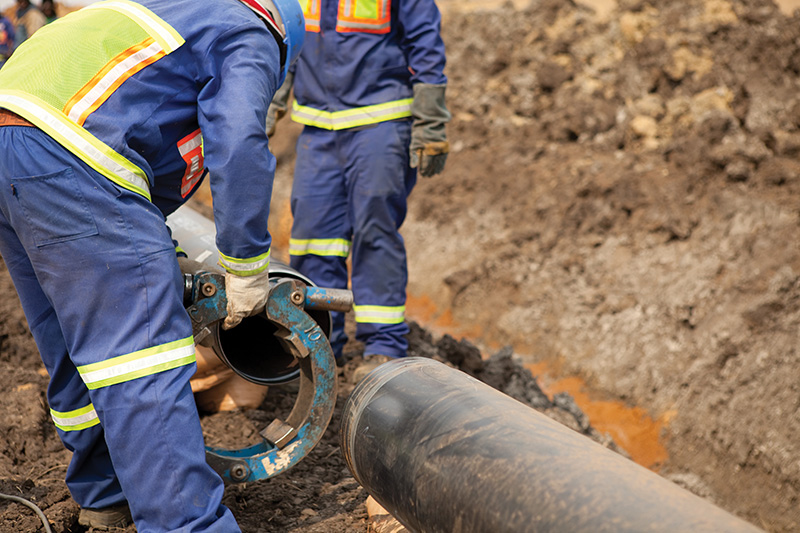Next Wave of North American LNG Export Projects to Face Labor Challenges
(Reuters) — A coming wave of North American LNG export projects faces staffing challenges that are prompting some of the biggest developers to expand training and coordinate projects to keep construction workers.
There are eight export projects now under way that when completed would add 86 million tonnes per annum (MTPA) capacity of the chilled natural gas. The projects have already created thousands of construction jobs and are soon to employ hundreds of operators.
Paul Marsden, head of Bechtel Corp.'s Energy global business unit, which has built 30% of the world's LNG plants in the last 20 years, said industry, labor and education must work together to provide the training and workers to staff all the projects.
"Labor has grown as an inflationary concern for everyone in the industry. We need to actively forecast and manage labor availability and supply chain like never before," Marsden said in an interview via email last week.
In the past, soaring construction costs in U.S. LNG projects hurt project economics and even led to bankruptcy for one major contractor, said Alex Munton, a director at consultancy Rapidan Energy Group.
"We have multiple projects that are under way at the same time and four mega projects, with the possibility of a fifth to be announced soon, and they require the same type of labor," he said. "This will drive up labor costs, increase schedule risks and create productivity issues."
Bechtel is developing projects with some 27 MTPA of new capacity, including Sempra's Port Arthur LNG project and an expansion at Cheniere Energy's Corpus Christi plant, with an additional 29 MTPA waiting for formal approvals to move ahead.
Workers Needed
At present Bechtel has more than 3,000 professionals working on its LNG projects. At peak, the company expects the number to grow to close to 20,000 craft professionals, Marsden said.
Cheniere Energy, one of Bechtel's largest customers and the biggest LNG exporter in the U.S., has scheduled its construction so it can move existing workers from the Corpus Christi expansion to its next project when that gets going, to ensure it does not lose workers. Two other projects — Golden Pass LNG and Plaquemines LNG — have added workers and are moving to 24-hour work schedules.
Cheniere preordered material for its newer Corpus Christi project to avoid inflation, said Chief Operating Officer Corey Grindal.
"We expect to be able to move from Stage 3 straight in to our further expansion, which is basically on the same compound, so we believe that with our contractor, Bechtel, we will be able to retain our workers," Grindal said.
Cheniere and Bechtel are training workers using virtual simulations or via partnerships with local schools.
LNG Canada, located in Kitimat in a remote corner of British Columbia, invested more than C$5 million ($3.74 million) in training including at local colleges, the company said.
The local area has few big facilities, "so we're trying to make sure we develop that workforce locally," LNG Canada CEO Jason Klein said.
Modular Designs
Some newer plants are employing modular and pre-built components to avoid the inflationary pressure of a stick-built plant by outsourcing some of the construction to countries with lower labor costs.
"We had more than 10,000 people at a time in different yards in China, and that just would not be possible in Kitimat," Klein said.
Commonwealth LNG, which hopes to get a financial green light for its first project by the end of the year, is also looking to modular plant designs to lower labor costs.
"The Australian projects, the initial ones, were as much as two to three thousand dollars per tonne of production, said Chairman Paul Varello. "Our number is like $700 per tonne."
Venture Global LNG stitched together 18 liquefaction units in its highly modular Calcasieu Pass LNG plant, allowing it to open the facility in what it said was record time. But problems with the equipment have prevented it from delivering contract cargoes, the company has said. First commercial cargoes will not be available until 2024, two years after processing began.
Related News
Related News

- Energy Transfer to Build $5.3 Billion Permian Gas Pipeline to Supply Southwest
- Enbridge Sees High Demand to Expand 593-Mile Canada-to-U.S. Gulf Oil Pipeline
- 450-Mile Eiger Express Pipeline Gets Green Light for Permian-to-Gulf Natural Gas Transport
- Duke Energy to Sell Tennessee Gas Business, 3,800 Miles of Pipelines, for $2.48 Billion
- Energy Transfer’s Lake Charles LNG Project Wins Export Extension
- Enbridge Sees High Demand to Expand 593-Mile Canada-to-U.S. Gulf Oil Pipeline
- Energy Transfer to Build $5.3 Billion Permian Gas Pipeline to Supply Southwest
- Russia Strikes Key Ukraine Gas Interconnector on Romania Border, Disrupts LNG Imports
- Ontario Seeks Study on Alberta-to-Ontario Pipeline and James Bay Port Corridor
- U.S. Energy Exporters Unlikely to Gain Big From Potential U.S.-India Trade Deal





Comments